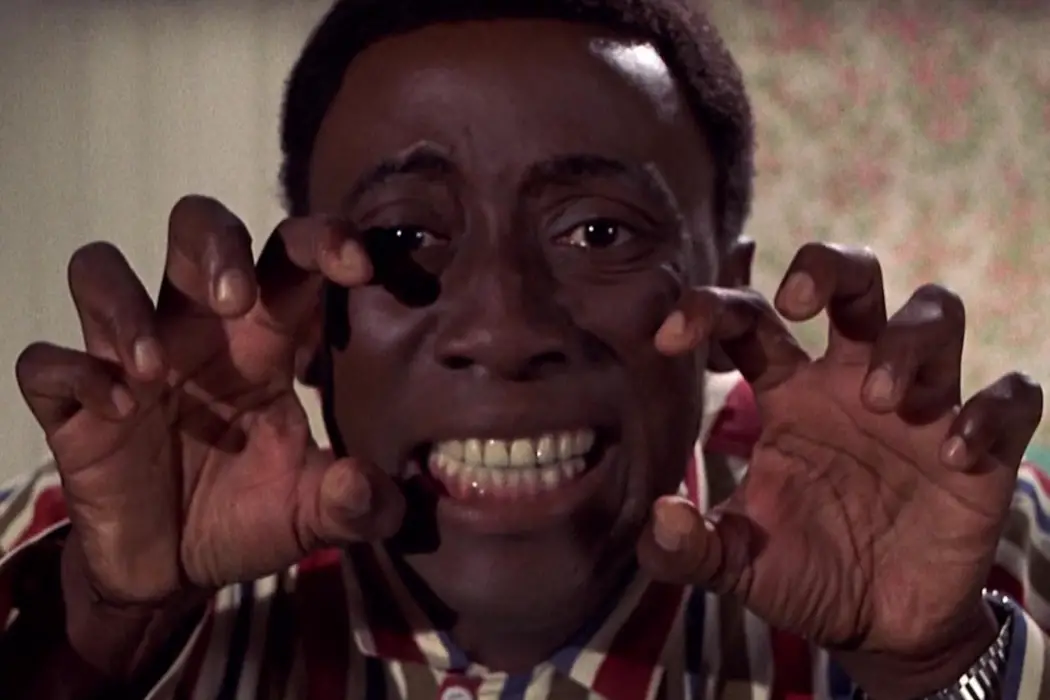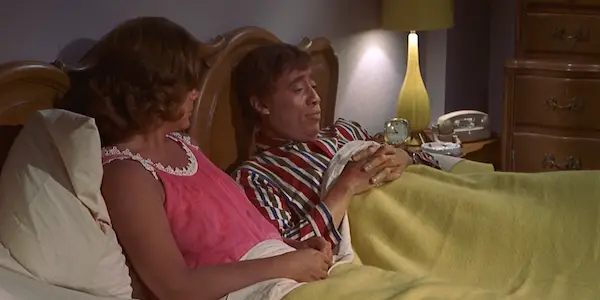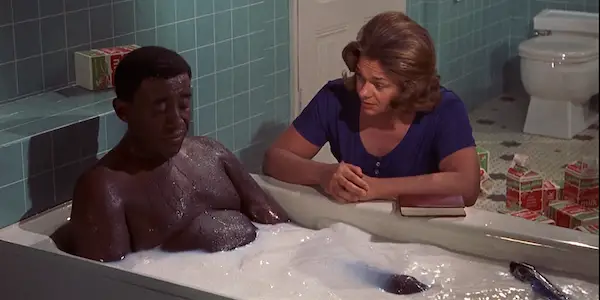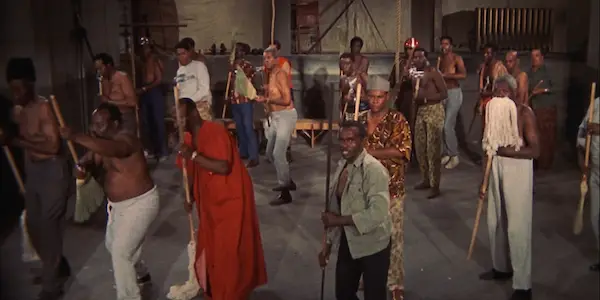WATERMELON MAN: Debunking the White Moderate

Frances is a graduate of film and digital media from…
While I was getting my film major, I saw a lot of classic movies in class, many more than once. One film I did not expect to see was a 1970 comedy about race relations, a quarter of which relied on whiteface, which held up not adequately but magnificently.
Watermelon Man is about a racist white businessman who essentially turns Black overnight. While under most circumstances this would go horribly wrong, the brilliant and radical director Melvin Van Peebles accomplishes it by using whiteface on his main actor, comedian Godfrey Cambridge, through the first part of the film. (My film professor noted when we watched it that the transformation was effective at the time through the casting of Cambridge, whose name and face were not well known, as its lead.)
After his transformation, Jeff Gerber (Cambridge) panics, goes into an existential crisis, and tries unsuccessfully to bleach his skin with various products before blaming his sun lamp in conjunction with his original lotion containing — don’t laugh — soy sauce. (His doctor later confirms that it was unrelated to the soy sauce, but that’s the culprit for most of the movie.)
Gerber attempts to become white again for most of the movie, discovering the bigotry harbored in his supposedly liberal community and the flightiness of the supposed white moderate. He is forced to confront his own overt prejudice in a way that his white friends and wife, with their sneakier brand of racism, refuse to do. Once he realizes he will never be white again, Gerber finally accepts his Blackness and turns from denial to Black power.
Deconstructing Racism
In the beginning of Watermelon Man, we meet Jeff Gerber’s wife, Althea. While Gerber is callous to most of the outside world and especially civil rights activists, Althea watches protests and police brutality on the news and shows “concern” about the “civil rights issue.” She seems sympathetic toward the idea of Black people, though she doesn’t actually seem to know any.

Throughout the beginning of the film, Gerber is casually racist, making racist jokes to Black service workers he encounters and generally being loud and unpleasant. When he makes statements like this, the white people around him generally look embarrassed, his wife even sometimes protesting his overt racism.
After Gerber wakes up Black, he remains in denial for most of the film. His attitude and racism stay mostly the same, though he is now on the defensive, disclaiming Blackness from himself as vigorously as he attempts to reclaim his whiteness. His wife, shortly after the metamorphosis, says, “don’t be so militant!” to which he responds, yelling, “I’m not militant, I’m white!”
Despite Gerber’s attempts to regain his position of privilege, the way society sees him obviously changes. Jeff Gerber used to race the bus every day, which was treated as an obnoxious but more or less acceptable behavior by his peers. The first day he races the bus after becoming Black, he ends up in the middle of a mob and surrounded by police officers. The Black bus driver gets him out of it, though the mob insists that “he stole something, we don’t know what!”
Even Gerber’s marriage fails to overcome his new lack of whiteness. Althea, at first so liberal-seeming initially eroticizes her husband’s Blackness and later becomes disgusted by it. She leaves him, claiming that her life is too hard now and his race has nothing to do with it.
Interestingly, the reactions of others to Gerber’s Blackness varies as well. Gerber’s white coworkers and friends greet him mostly with “my goodness, what happened?” and the like. The Black service workers and subjects of his casual racism through the first portion of the film treat him differently too, generally humoring his bad attitude less, but they almost universally respond with something like, “huh… I never noticed.”
Absurdist Comedy
It would seem a difficult topic to treat gracefully, let alone humorously, but that’s what makes Watermelon Man so iconic. The combination of Melvin Van Peebles‘ direction and Godfrey Cambridge‘s comedic talent makes their film the unlikeliest of great comedies.

The deadpan Cambridge brings to Jeff Gerber is second to none. His delivery of the many, many jokes in Watermelon Man is natural and disarming. After he initially transforms, he shifts between pure panic and manic fervor, saying things like “what a great sun lamp!” and drinking quarts of milk at a time. (He later bathes in the stuff, giving us the line, “oh cleanse me, great milk!” delivered most aptly.)
It’s not the (often tense and/or racist) situations that are funny in Watermelon Man. Instead, it’s Gerber’s reactions to the situations. Like any great comedian, Cambridge hops easily between witty dialogue and goofy visual gags, never making fun of the racially charged situations in the film, but of the absurdity of racism itself.
In one of the most off-putting jokes of the film, Gerber picks up a hate call while waiting to hear from his doctor. The voice on the phone tells him to move out and calls him a slur in a low voice before hanging up. His wife asks if it was the doctor, and Gerber deadpans, “I hope not!”
Thanks to Melvin Van Peebles
The slogan on the posters for Watermelon Man reads: “It won’t happen to you, so you can laugh.” The film is self-aware, culturally aware, and masterfully written and directed. Though most of the movie is fairly light, considering the subject matter, there is a clear depth and insight from Melvin Van Peebles.
This is most intense in the final moments of the film, when Jeff Gerber has accepted that he will never be white again, and that society will never see him the way it used to. He has his own apartment, is separated from his wife and children, and has taken up exercising again — practicing martial arts with a Black liberation group. This revelation is an unexpected but most fitting end for this comedy.

Apparently, Van Peebles and Herman Raucher (screenwriter) had different ideas about the central themes of Watermelon Man. Raucher intended it as a satire of white liberal America, while Van Peebles preferred themes of Black power. The finished product seems to serve both of these goals, disarming its audience with satire and ending with a gut punch of empowerment.
Raucher also wanted an it was all a nightmare ending where Gerber would wake up white again. Luckily for the rest of the world, Van Peebles agreed to shoot it both ways, and “forgot” to shoot the dream version. “You think I’m gonna fall for that?” he said in an interview.
It was a minor miracle, and in great part attributable to Van Peebles, that Watermelon Man turned into such a masterpiece. We are a better and funnier world for it. The film is still not as well known as it deserves to be, and even now it, unfortunately, remains as timely as ever. It is a valuable watch as a historical icon and radical piece of media — from a major studio, no less — and is still an enjoyable, and very funny, way to spend an afternoon.
Do you think Watermelon Man is an effective deconstruction of racism? Let us know in the comments!
Watermelon Man is currently streaming on the Criterion Channel and for free from Pluto TV.
Watch Watermelon Man
Does content like this matter to you?
Become a Member and support film journalism. Unlock access to all of Film Inquiry`s great articles. Join a community of like-minded readers who are passionate about cinema - get access to our private members Network, give back to independent filmmakers, and more.
Frances is a graduate of film and digital media from California. She enjoys watching and expounding theories on cinema, especially when experimental or directed by women. In her spare time she enjoys reading short stories and writing queer fantasy.













